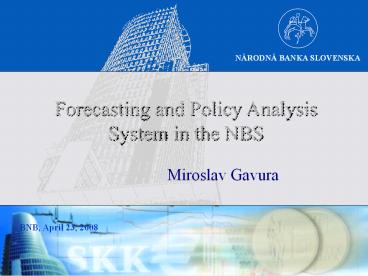Miroslav Gavura - PowerPoint PPT Presentation
Title:
Miroslav Gavura
Description:
Title: Maastricht and Sustainability Author: Lalinsky Last modified by: Emilia Created Date: 7/10/2006 2:59:19 PM Document presentation format: On-screen Show – PowerPoint PPT presentation
Number of Views:81
Avg rating:3.0/5.0
Title: Miroslav Gavura
1
Forecasting and Policy Analysis System in the NBS
- Miroslav Gavura
2
Structure of the presentation
- Motivation Stylized facts
- Organizational framework of FPAS
- Key Features of macroeconomic model
- Future challenges - projects
3
Motivation Stylized facts
- 3 periods of monetary-policy strategy in the NBS
- 1993-1998 Fixed exchange rate regime
- Price stability through fixed exchange rate
(band) - M2 intermediate target
- 1999-2004 Orientation to qualitative conduct of
monetary policy (MP) - Implicit inflation targeting
- Managed floating
- 2005 - current Explicit inflation targeting
- Inflation targeting in conditions of ERM II
4
Motivation Stylized facts
MP3 Inflation target
5
Motivation Stylized facts
- Inflation Targeting
- Focus of MP on price stability time lag between
action and reaction of MP is longer than 1 year
Medium-term horizon - Role of inflation expectation important
transmission channel - Requirement of new forecasting and policy
analysis system (FPAS)
6
FPAS - Required changes
- New organizational structure of forecasting
process - Formalization of forecasting process
- Formalization of forecasting team
- Development of new analytical tool Quarterly
projection model (QPM) - Communication strategy
- Medium-term forecast main communication
document - Focus on inflation forecast linked to inflation
target - Risk analysis
7
FPAS Implementation (2 years)
- May 2003 - Technical assistance of the IMF
- Two short visits of experts from the Czech
National Bank - Focused on technical cooperation in model
building (QPM) and efficient managing of the new
forecasting process implementation - Autumn 2003 - Presentation of the model for
discussion in the bank (structure and properties) - Spring 2004 internal forecasts using the model
in Monetary policy department (for economists) - July 2004 presentation for the Bank Board
- Structure and properties of the model
- New forecasting process
- Example of report (Medium-term forecast)
8
FPAS Implementation
- 2nd half of 2004 Testing phase
- Two internal forecasting processes
- Presented in the Board not published
- December 2004 Inflation targeting officially
announced - April 2005 First publication of the Medium-term
forecast - Presentation of the model and forecasting process
for professional economists - June 2005 Conference on econometric modelling
9
FPAS Medium-term forecast
- Key document for monetary-policy decisions and
communication to public - Prepared on quarterly base
- Publication version (www.nbs.sk)
- Analysis of current economic development
- Estimation of current state of economy (cyclical
part of economy) - Medium-term forecast of economy until 2008, focus
on inflation forecast - Evaluation of risk analysis inflation forecast
in a form of Fan chart (8 quarters ahead) - Internal version - provides detailed information
of forecast - Recommendation on interest rate trajectory
- Detailed description of alternative scenarios
10
FPAS organization of forecasting process
- Forecasting team
- Head of forecasting team (member of the Board)
- Coordinator of forecasting team
- Forecasting team (12 experts)
- Forecasting process
- 6 weeks
- 6 regular working meetings 2 meetings with the
Board - Documentation
- Reports
- Archiving (common network disc free access to
documents)
11
FPAS organization of forecasting process
- 3 chronologically subsequent sub-processes
- Initial assumptions of forecast (exogenous
environment) - Current position of economy and short-term
forecast (3 quarters ahead) - Medium-term forecast until 2008 and risk analysis
12
FPAS organization of forecasting process
- Meetings
- Issue meeting
- Initial assumptions
- Short-term forecast (3Q ahead), equilibrium
trends and current state of economy - Presentation of NTF to the Bank Board
- Preparing medium-term forecast (iterative
process) - Finalization of the medium-term forecast and
alternative scenarios - Presentation of the Medium-term forecast
- Post Mortem meeting
13
FPAS key features of QPM (1)
- Gap model - modelling cyclical part of economy
- Description of transmission mechanism for small
open economy - Exogenous supply side assumption of real
convergence - Systematic control of inflation through active
monetary policy modified Taylor rule - Endogenous exchange rate
- Forward-looking components
- Economic agents inflation, exchange rate
- Central bank reaction function
14
FPAS key features of QPM (2)
- Two separate blocks
- Block of cyclical part of economy (QPM model)
- describes transmission mechanism, impact of MP on
economy and prices - Block of long-run equilibrium trends
- Estimation of unobserved trend and cyclical
variables form measured economic indicators on
history using Multivariate Filter with Unobserved
Components (MVF-UC)
15
FPAS key features of QPM (3)
16
FPAS role of model in forecasting process
- Systematic control of inflation through active
monetary policy modified Taylor rule - Model provides information what is necessary to
do in order for future to correspond with target - Analytical tool useful both for purposes of
projection and alternative scenarios - Different development of exogenous variables
- Different intensity of economic mechanisms (e.g.
effect of exchange rate) - Possibility to evaluate main risk factors related
to target
17
Future challenges - Entry to Eurozone
- FPAS
- Effort to increase compatibility with BMPE
- BMPE versus internal forecasting exercise
- Co-operation with ECB, CBs
- Modelling
- MCM type model (AWM synthesis)
- DSGE
18
- THANK YOU FOR ATTENTION
19
Motivation Stylized facts
- Monetary policy 1993 - 2004
- Monetary programme main document to the public
- Once a year at the end of previous year for
the current year - focus on short-term horizon forecast for one
year ahead - No complex econometric model
- Forecast mostly based on judgmental approach
- Simple regression methods (single equation models)

